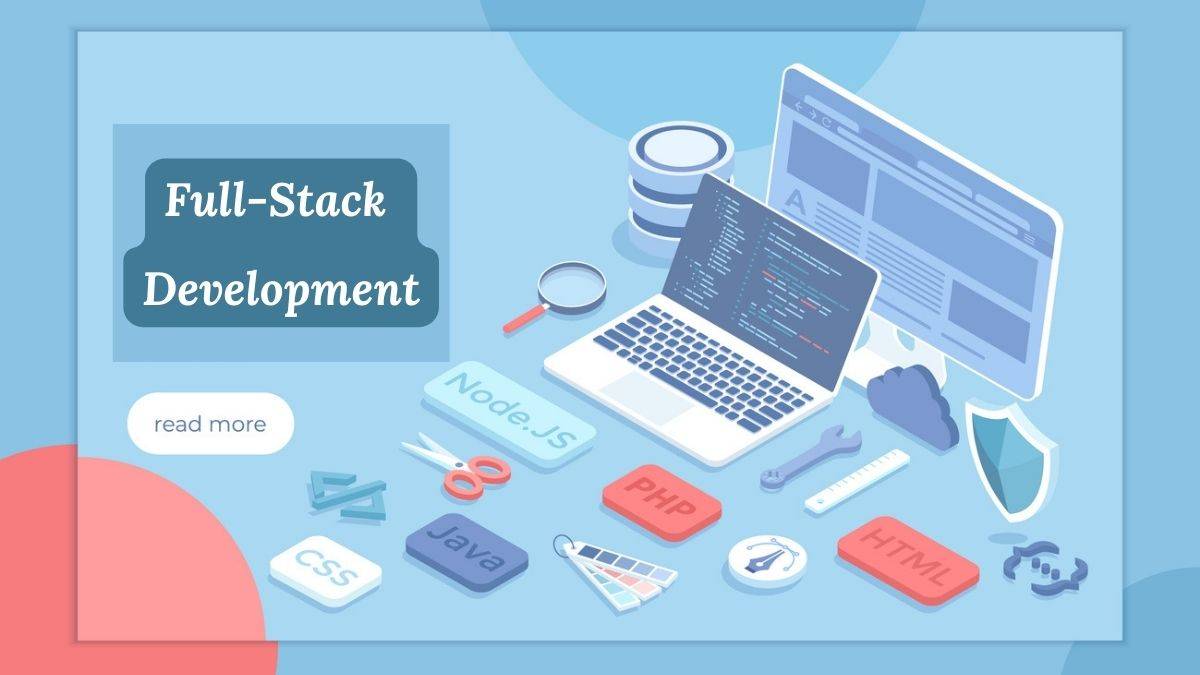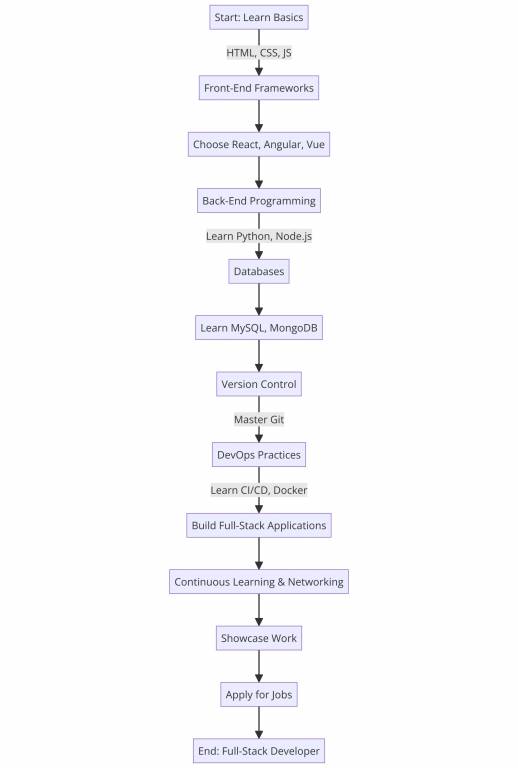Fullstack Development Courses & Certifications Online
Full-stack development refers to the practice of developing both the front-end (client-side) and back-end (server-side) components of web applications. Full-stack developers are proficient in handling all aspects of web development. Enrolling in online Full-Stack Development Courses can be a good option if someone wants to learn more about Full-Stack Development and its related aspects.
Online Full Stack Development courses provide students with a thorough understanding of both the client and server sides of web applications. These programs encompass a range of topics, including front-end development, back-end development, database management, version control, and deployment strategies.
Explore Full Stack Development Online Courses & Certifications
Why Learn Full-Stack Development Online
- Access to Specialized Courses
Online programs offer a wide array of courses specifical
Full-stack development refers to the practice of developing both the front-end (client-side) and back-end (server-side) components of web applications. Full-stack developers are proficient in handling all aspects of web development. Enrolling in online Full-Stack Development Courses can be a good option if someone wants to learn more about Full-Stack Development and its related aspects.
Online Full Stack Development courses provide students with a thorough understanding of both the client and server sides of web applications. These programs encompass a range of topics, including front-end development, back-end development, database management, version control, and deployment strategies.
Explore Full Stack Development Online Courses & Certifications
Why Learn Full-Stack Development Online
- Access to Specialized Courses
Online programs offer a wide array of courses specifically customised to full-stack development, including web development frameworks, database management, and server-side scripting. These specialised courses cover technologies and methodologies not always available in traditional on-campus settings.
- Flexibility for Developers
Online learning allows current developers and aspiring programmers to continue their education and enhance their skills without interrupting their careers. It enables them to balance work, studies, and personal life effectively.
- Exposure to Different Development Practices
Online full-stack development programs often attract students from various regions and industries. They provide exposure to various development practices, cultural perspectives, and real-world projects across different types of businesses.
- Networking with Industry Peers
Many online programs include virtual networking events, discussion forums, and collaborative projects, allowing students to connect with other developers and industry professionals globally, which can significantly expand their professional network.
- Hands-on Experience with Development Tool
Online courses in full-stack development often include practical training with essential tools and platforms, such as GitHub, Docker, and various Integrated Development Environments (IDEs). This prepares students for the practical aspects of both front-end and back-end development.
- Staying Updated with Technological Advances
Online full-stack development programs are quick to update their curriculum to reflect the latest technologies, best practices, and industry standards in web development. This ensures that students are learning the most up-to-date skills relevant to the current job market.
- Specialised Development Tracks
Online courses in full-stack development frequently offer specialised tracks in areas like mobile development, cloud applications, or cybersecurity. This allows students to customise their learning to specific interests and career aspirations within the broad field of web development.
Career in Full-Stack Development
| Position |
Job Role |
Average Salary |
| Full Stack Developer |
|
₹6.0 Lakhs |
| UI/UX Designer |
|
₹7.0 Lakhs |
| DevOps Engineer |
|
₹12.0 Lakhs |
| Software Architect |
|
₹15.5 Lakhs |
| Front-end Developer |
|
₹5.5 Lakhs |
| Back-end Developer |
|
₹8.0 Lakhs |
| System Administrator |
|
₹9.0 Lakhs |
| Database Administrator |
|
₹10.5 Lakhs |
Source: AmbitionBox
How to Learn Full-Stack Development Online?
Below is a flowchart showing how to learn full-stack development online:
Eligibility Criteria For Admission in Full-Stack Development Courses
The eligibility criteria for admission into Full Stack Development courses can vary depending on the course level (certificate, diploma, undergraduate, or postgraduate) and the institution offering the course. Here’s a general overview of the typical eligibility requirements:
| Criteria |
Details |
| Educational Qualification |
|
| Entrance Exams |
|
| Work Experience |
|
| Age Limit |
|
| Reservation Policy |
|
| Language Proficiency |
|
| Additional Requirements |
|
Types of Full-Stack Development Courses
Undergraduate Online Full-Stack Development Courses
| Course Name |
Provider |
Duration |
| Associate of Applied Science in Computing and Information Technology: Software–Web Development |
College of Southern Nevada |
24 Months |
| Online Bachelor of Science in Graphic Information Technology - Full-Stack Web Development |
Arizona State University |
48 Months |
Postgraduate Online Full-Stack Development Courses
| Course Name |
Provider |
Duration |
| IIIT Bangalore |
13 Months |
|
| Information and Communications Technology (Web Design and Development), MS |
University of Denver |
18 Months |
| Post Graduate Applied MasterCLaaS® Program in Software Engineering Management |
Yangpoo EduClaas |
24 Months |
| Fort Hays State University |
24 Months |
Top Online Certifications in Full-Stack Development
1. Crash Course in Full Stack Development at Great Learning
2. IBM Full Stack Cloud Developer Professional Certificate at Coursera
3. Learn Web Development at Internshala
4. Crash Course in Full Stack Development at Great Learning
What Will You Learn In An Online Full-Stack Development Course?
Technical Skills
| Skill |
Description |
| Front-end Technologies |
Master HTML, CSS, and JavaScript to build interactive user interfaces. Learn frameworks like React, Angular, or Vue.js for more complex applications. |
| Back-end Development |
Develop server-side logic using languages such as Node.js, Python, Ruby, or Java and frameworks like Express, Django, or Spring. |
| Database Management |
Learn to implement and manage databases using SQL (like MySQL or PostgreSQL) or NoSQL (like MongoDB) technologies for data storage and retrieval. |
Programming and Integration Skills
| Skill |
Description |
| API Development |
Design and develop RESTful APIs to connect front-end and back-end components of applications. |
| Version Control |
Gain proficiency in Git for tracking changes in source code during software development. |
| Testing and Debugging |
Learn to write tests with frameworks like Jest or Mocha and debug applications to ensure reliability and performance. |
Interpersonal Skills
| Skill |
Description |
| Team Collaboration |
Collaborate effectively in team settings, utilise tools like GitHub and participate in Agile development processes. |
| Problem-Solving |
Develop strong analytical skills to solve complex programming challenges and optimise code efficiency. |
| Effective Communication |
Enhance communication skills to convey technical information to non-technical stakeholders clearly. |
Strategic Skills
| Skill |
Description |
| Responsive Design |
Use responsive design principles to create web applications that work on various devices and screen sizes. |
| Security Best Practices |
Implement security measures to protect websites and applications from cyber threats. |
| Performance Optimization |
Optimise website and application performance to enhance user experience and reduce load times. |
Operational Skills
| Skill |
Description |
| DevOps Practices |
Understand the basics of DevOps practices, such as continuous integration and continuous deployment (CI/CD). |
| Cloud Deployment |
Learn to deploy applications to cloud platforms like AWS, Azure, or Google Cloud Platform. |
| Containerization |
Get hands-on experience with container technologies like Docker and Kubernetes for application deployment and scaling. |
 All FiltersClear All
All FiltersClear AllFullstack Development Courses & Certifications Online





